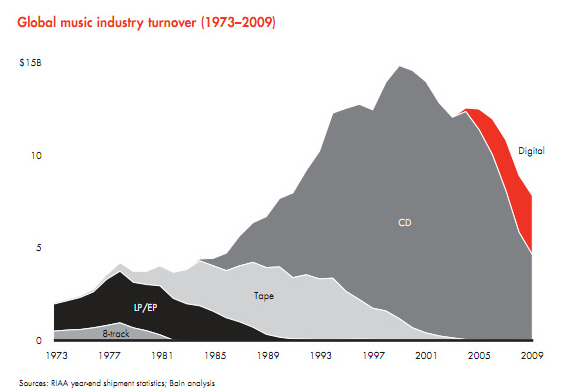 Music consumed on mobile handsets will generate $5.5 billion annually in 2015, a rise of $3.1 billion from 2010
Music consumed on mobile handsets will generate $5.5 billion annually in 2015, a rise of $3.1 billion from 2010
The music recording business can rest easier if Juniper Research’s new report is to be believed, we say easier as the $5.5 billion is a drop in the ocean, compared to the money the industry has lost in CD sales over the last ten years. Total US music sales peaked in 1999 at around $14.6 billion a year with the majority of that coming from CD sales, it is now around half of that figure ($6.3 billion in 2009) and CDs sales account for the majority of the sales.
The report finds that mobile music is becoming an increasingly important part of the digital music sector, which is propping up a failing industry hit by over a decade of widespread online piracy.
Since the popularisation of P2P file sharing at the end of the last century, the music industry’s sales have gone into free fall, as consumers rejected the physical distribution of music in favour of easier, but illegal means of acquiring it. The industry response was initially slow, but legal digital distribution services, such as Apple’s iTunes are now blossoming, and mobile handsets are increasingly becoming the key platform for them.
Mobile Music Opportunities report author Daniel Ashdown argues: “Initially, PC downloading and sideloading to MP3 players was the only way to go; but the development of mobile devices has now reached the point where they match the technical specs of dedicated MP3 players. Add in connectivity – just one click to buy and download – along with all the other smartphone features, and there is no competition between the two. This is why sales of Apple’s iPhone are going to outstrip its iPod in the not too distant future.”
However, the report warns that piracy still remains a significant threat – both online and on the mobile. Juniper Research finds that P2P file sharing is slowly migrating to the mobile, with BitTorrent applications now available on Android Market, for example. With the rollout of 4G networks about to increase, the report recommends that the graduate response – enacted by legislation in many countries – be strongly enforced and expanded to mobile networks.
It’s also very apt that on the day the report is published Spotify declares that it’s looking for $100m in funding from the Facebook investor Digital Sky Technologies (DST) and Silicon Valley firm Kleiner Perkins, which owns a stake in Twitter and FarmVille-creator Zynga which would value the business at $1bn (£616m).
** 22/02 This graph is actually US figures not worldwide and there are apparently issues over the figures. If you want to read more read this very useful piece on Business Insider And you can better figures on digital music at the IFPI site here

